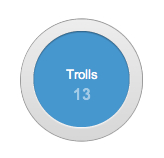What's a friend?
 Thursday, July 21, 2011 at 06:10AM
Thursday, July 21, 2011 at 06:10AM Thank you for being a friend
Andrew Gold
The ability to create circles of types of acquaintances in Google+ has me asking: What exactly constitutes a "friend?"
That was a pretty easy question to answer as a kid whose "circle" was comprised of classmates, neighborhood hoodlums, and the odd cousin. I remember a pen-pal or two, but friendship was a term easily defined: other kids you liked and played with.
Facebook asked most of us to re-think who our "friends" are. What's the difference between a friend, a family member, a colleague, and an acquaintance? I am regularly haunted by seeing names that look vaguely familiar, but I just can't place. Is this someone I once worked with? Someone from the community? Someone to whom I was once married? Is a person you see once a year at a conference really a "friend?" Is someone you only know online a friend? Is it OK to say to someone who you don't know - or don't remember, "I don't want to be your friend." How do we navigate all these social networking streams without hurting feelings or making blood enemies or being a cad?
Where is the Miss Manners of Facebook?
Anyway, with Google+ and it's "circles" that help define relationships, I've decided to become much more granular. Here are some circles I've created so far:

- I have no clue who these people are.
- Potential stalker
- Potential stalkee
- People who owe me money
- Relatives I like
- Relatives I avoid
- People I see at conferences once a year
- People I avoid at conferences once a year
- People who say nice things on my blog
- Trolls
- People who care enough about me that they'd like to know what I had for breakfast (0)
- Nagging editors
- Women with really cute profile photos
- Creepy people, nut jobs, and fellow bloggers
- Misc.
OK, maybe I am being a little tongue-in-cheek here, but it is nice to easily be able to group your "friends" according to what information you like to send out and whose information you'd like to read.
Like I opined yesterday, these easy-to=create groupings will make Google+ especially useful for teachers and students.
My guess is that Facebook will remain my tool for communicating with my personal friends (at least people I could pick out of a line-up) and relatives; Google+ for professional colleagues; and Linked-In for anybody who wants to network.
The world is becoming ever more confusing.









Reader Comments (6)
I am entertaining many of the same thoughts about Google+, although I don't have nearly as many categories as you ;-)
On another, slightly related note, we are considering taking the guerrilla route with teaching Google apps to our teachers and students this year. We are tired of waiting for our school district to admit that an integrated system such as Google apps for education would be preferable to the multitude of machine-based (IBM Lotus Notes, Microsoft Office, Pentamation, Gradespeed, etc., etc., etc.,) software we currently use. (Did you know we STILL can't access our school email on our smart phones? Geesh!)
Do you have any advice for a couple of kooky high school librarians (who, by the way, have full support of their building principal) who want to undermine the status quo of their stuffy, fearful district IT department?
Hi Len,
My only strategy for counter-balancing any over-powerful person or group, be it tech director, building principal, librarian - is to make sure there is a good advisory committee in place. If you don't have one, form one and speak as a group directly to administration.
Good luck!
Doug
Wondering which category I would be in and afraid that you will tell me.
I enjoyed this post, Doug, but one thing I will say about the whole "friends" thing online is that it has enabled some relationships to grow well beyond people I just see a few times a year into trusted colleagues, and in some cases, yes, friends that I would ask what they had for breakfast.
I am with Mary M on this post and wondering what category I am in... and hoping it isn't the "creepy nut job" category! LOL! I am really excited about Google + and thinking there may be a great potential for its use in our schools. I am hoping when things settle down for me, I can really dive in and get a good understanding of it. (I will admit - I am coming late to that party!)
Hi Mary and Jen,
Well, I didn't list ALL the circles I use. I have you both in the Professional Colleague and Personal Friend circles. I consider you a valued members of both.
I must really be selfish - I've never cared about what others have for breakfast!
Doug
As someone who has gone the guerilla route multiple times, I have to disagree with your advisory committee suggestion -- an advisory committee would be led by and made of the same people who are scared to push forward in the first place!
The key in a guerilla effort like this is to put in as much work as it takes to make your solution -flawless-. If you're going to help a teacher get started using Google Docs, you need to be available as much as possible. That teacher should have an amazingly good experience, such that he or she will be 100% on your side with questioning why the Tech Dept is fighting against such a practical tool.
Then, you repeat that with more teachers, as you see opportunities to authentically solve their problems with your solution. Administrators can push back against unimplemented technology tools, but they'll expose themselves as ridiculously poor managers if they try to veto a tool that is already saving time and money.
tl;dr: Just do it, but do it /right/.